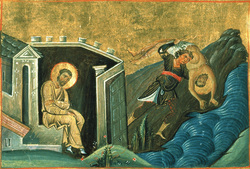
At Antioch, Lucian was ordained presbyter. Eusebius of Caesarea notes his theological learning and Lucian's vita (composed after 327) reports that he founded a Didaskaleion, a school. Scholars following Adolf von Harnack see him as the first head of the School of Antioch, with links to later theologians Diodorus of Tarsus and Theodore of Mopsuestia, but that contention is unrecorded in the extant sources.
After the deposition of Antioch's bishop Paul of Samosata, he fell under suspicion for heresy, and was excommunicated. According to Alexander of Alexandria, he remained in schism during the episcopates of three bishops, Domnus, Timaeus and Cyril, whose administration extended from 268 to 303. Lucian was reconciled with the Church either early in the episcopate of Cyril (perhaps about 285), which seems more likely, or under Cyril's successor Tyrannus.
During the persecution of Maximinus Daia, Lucian was arrested at Antioch and sent to Nicomedia, where he endured many tortures over nine years of imprisonment. He was twice brought up for examination, and both times defended himself ably and refused to renounce his Christian faith.
His death is uncertain. He might have been starved to death. Another, more likely, possibility is that he was beheaded. The traditional date ascribed to his execution is January 7, 312, in Nicomedia. There is a late tradition of uncertain origin that he had been drowned in the sea and that his body was returned to land by a dolphin.
He was buried at Drepanum on the Gulf of Nicomedia, which was later renamed Helenopolis to honour Helena, mother of Constantine the Great.
He is also commemorated as a saint, with a feast day of January 7.
Source




